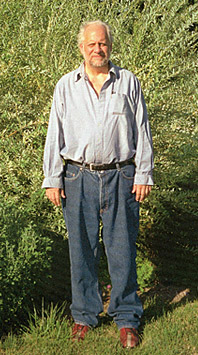Pursuing Happiness
by George Ball
At our upcoming, June 22 and 23, Fordhook Farm Open Days, we shall both examine and celebrate happiness, and all that flowers, shrubs and ornamental trees do to bring it into being. We shall have speakers, tours and demonstrations of happiness in the gardens.
“Huh?”, I hear someone asking, and understandably so. “Of course”, they say, “gardens filled with flowers bring happiness—everyone knows this. It is self-evident.”
But why is this so? And how does it work?
At first, it appears, so to speak, to be related to the evolution of our eyes. Crudely stated, colors signify food; food brings about another day; another day gives us happiness, especially considering the alternative. But there is more to beauty, poetry, space and time, than food for the next day.
Take “happiness” itself. Next month, on July 4th, we shall celebrate Independence Day, when “life, liberty and the pursuit of happiness” were made the sacred goals of our new nation in 1776 by Thomas Jefferson, one of history’s greatest gardeners.
Jefferson used the word “happiness” in its then current context and meaning: wealth, prosperity, health—what today would be called “well being”. But there was in the late 1700s an added dimension to the word not common today—“luck” and “chance”. Jefferson meant “opportunity”, but suggested it elegantly in a word with more emotional power and ability to carry its multiple meanings. From the early modern era (the 1200s to 1500s), this chance-oriented definition of happiness was the common one—oddly unexpected and even contrary to the notions of balance and harmony that we use today.
Now we hardly associate luck and chance with contentment and a peaceful sense of euphoria or bliss. These feelings come after you win the big lottery, and perhaps also after the psychotherapy you need to come to terms with your new identity. That is, if you’re lucky.
How did this early meaning of happiness originate? Our word “hapless” is a vestigial clue. A hapless person is invariably stricken by bad luck. Another clue can be found in the way “happiness” is adopted by the Chinese who learn English. Happiness means only luck to the Chinese. You find the word frequently in Chinese restaurant menus.
The Oxford Dictionary of Etymology provides still earlier and somewhat odder clues: the “fate” and “destiny” of a person was associated with the root word of “happy” in Old Slavonian (“kobu”) and Old Czech (“koba”), respectively. At first glance, fate and destiny seem diametrically opposite to luck and chance—at least from our contemporary perspective.
Yet, when you think about it, you detect patterns. Jefferson wasn’t referring to feelings. I lug down my Johnson’s Dictionary. There is another clue. A “happy” person is “ready”, as Johnson puts it in definition #3. As in “fit”, this definition fits the concept of happiness very well. “Life, liberty and the pursuit of whatever fits me—I’ll be ready for it.”
The Declaration of Independence becomes even more interesting when you consider, “pursuit”, my favorite word in Jefferson’s phrase. I like to think that he was most proud of “pursuit”. It means “occupation” in its secondary definition. Certainly, one wishes to pursue something that fits or is fitting one’s goal or purpose. As Homer suggested, “The journey is greater than the destination.” And one always has to earn—or win—one’s occupation, by either luck or pluck.
My horticulture mentor, Claude Hope, used the word “happy” to describe plants that were thriving in their position or site in a garden. “It’s very happy there”, he’d say about a begonia. “They love it, they’re happy,” referring to a bed of orange hybrid impatiens in an English park. A very fit man, Claude Hope was descended from a long line of Scotch Irish dairy farmers and, earlier, peasants. Like my grandfather’s grandfathers. Peasants of peasants. “Land races”, to use a horticultural term. No drawing rooms, pubs or long dinners of, well, happy conversation for them, as for Messrs. Johnson and Boswell.
Claude’s and my forebears were not especially happy, in all likelihood, except in the definition of “lucky”. Indeed, they were “yearning to breathe free”, in the words of the poet Emma Lazarus, carved into the base of the Statue of Liberty. So, one way or another, they pursued happiness.
Like a composite flower, the word “happiness” collects all of these old and new forms and presents them to us. Contentment, well-being and a sense of euphoria are derived from the good luck of having ancestors who were fit to make it across the Atlantic, the Pacific or overland to a place where fortune smiles and a person’s destiny or fate can be discovered.
A happy word, then, is “happiness”.
Please join us at our upcoming Fordhook Farm Open Days on June 22 and 23.
